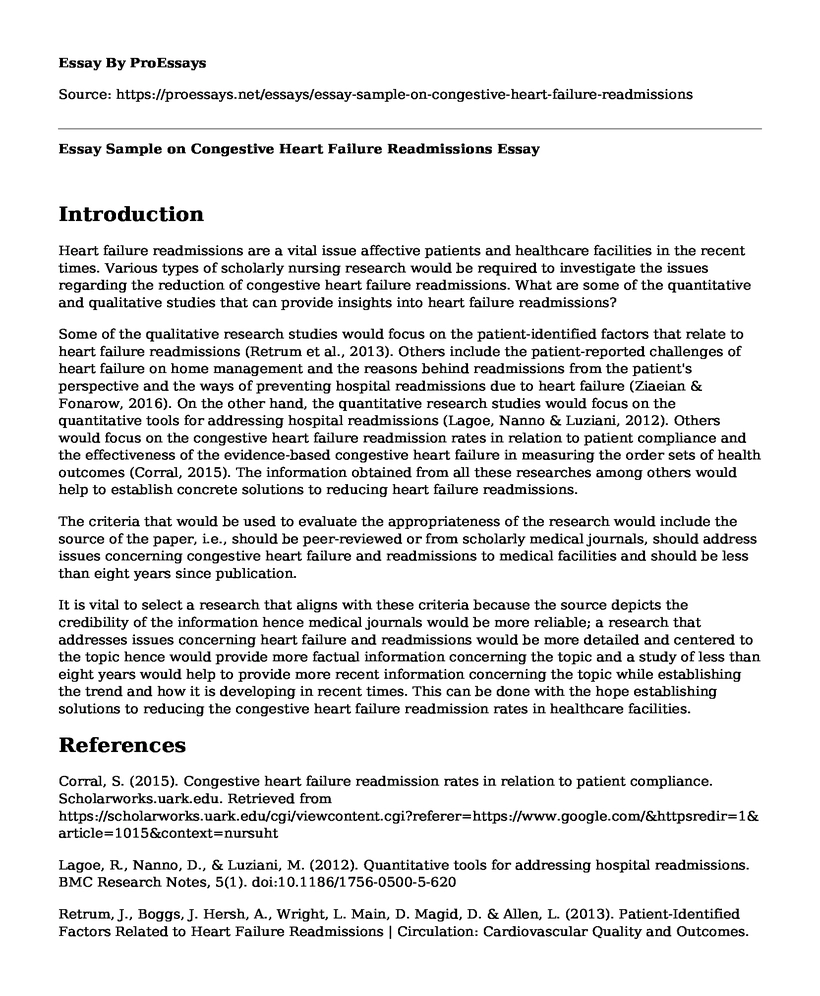Introduction
Heart failure readmissions are a vital issue affective patients and healthcare facilities in the recent times. Various types of scholarly nursing research would be required to investigate the issues regarding the reduction of congestive heart failure readmissions. What are some of the quantitative and qualitative studies that can provide insights into heart failure readmissions?
Some of the qualitative research studies would focus on the patient-identified factors that relate to heart failure readmissions (Retrum et al., 2013). Others include the patient-reported challenges of heart failure on home management and the reasons behind readmissions from the patient's perspective and the ways of preventing hospital readmissions due to heart failure (Ziaeian & Fonarow, 2016). On the other hand, the quantitative research studies would focus on the quantitative tools for addressing hospital readmissions (Lagoe, Nanno & Luziani, 2012). Others would focus on the congestive heart failure readmission rates in relation to patient compliance and the effectiveness of the evidence-based congestive heart failure in measuring the order sets of health outcomes (Corral, 2015). The information obtained from all these researches among others would help to establish concrete solutions to reducing heart failure readmissions.
The criteria that would be used to evaluate the appropriateness of the research would include the source of the paper, i.e., should be peer-reviewed or from scholarly medical journals, should address issues concerning congestive heart failure and readmissions to medical facilities and should be less than eight years since publication.
It is vital to select a research that aligns with these criteria because the source depicts the credibility of the information hence medical journals would be more reliable; a research that addresses issues concerning heart failure and readmissions would be more detailed and centered to the topic hence would provide more factual information concerning the topic and a study of less than eight years would help to provide more recent information concerning the topic while establishing the trend and how it is developing in recent times. This can be done with the hope establishing solutions to reducing the congestive heart failure readmission rates in healthcare facilities.
References
Corral, S. (2015). Congestive heart failure readmission rates in relation to patient compliance. Scholarworks.uark.edu. Retrieved from https://scholarworks.uark.edu/cgi/viewcontent.cgi?referer=https://www.google.com/&httpsredir=1&article=1015&context=nursuht
Lagoe, R., Nanno, D., & Luziani, M. (2012). Quantitative tools for addressing hospital readmissions. BMC Research Notes, 5(1). doi:10.1186/1756-0500-5-620
Retrum, J., Boggs, J. Hersh, A., Wright, L. Main, D. Magid, D. & Allen, L. (2013). Patient-Identified Factors Related to Heart Failure Readmissions | Circulation: Cardiovascular Quality and Outcomes. (2019). Circulation: Cardiovascular Quality And Outcomes. Retrieved from https://www.ahajournals.org/doi/10.1161/CIRCOUTCOMES.112.967356
Ziaeian, B., & Fonarow, G. (2016). The Prevention of Hospital Readmissions in Heart Failure. Progress In Cardiovascular Diseases, 58(4), 379-385. doi:10.1016/j.pcad.2015.09.004
Cite this page
Essay Sample on Congestive Heart Failure Readmissions. (2022, Dec 22). Retrieved from https://proessays.net/essays/essay-sample-on-congestive-heart-failure-readmissions
If you are the original author of this essay and no longer wish to have it published on the ProEssays website, please click below to request its removal:
- Safety, Nutrition and Health in Early Education - Course Work Example
- Problem Solution Essay on Unhealthy Eating Habit
- Essay Sample on Pros and Cons of Vaccinations
- Application for a Spine Surgery Fellowship
- The Causes and Effects of Stroke Condition on a Client Paper Example
- Essay Example on Managing Chronic Pain With Cannabis: Pros & Cons
- Diabetes Threatens Australia: 1.2M Suffer, 4.9% of Population - Essay Sample







